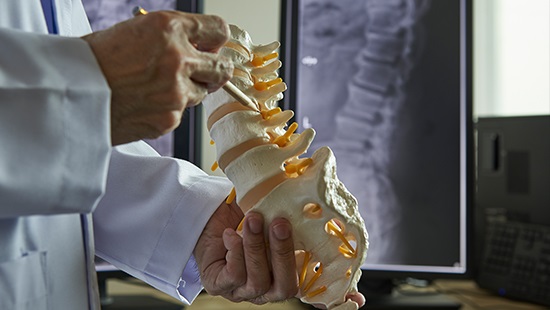Arthritis of the Spine

Also called spinal osteoarthritis or simply arthritis of the spine, spine arthritis is a degenerative joint disease, occurring as a result of cartilage around the spinal joints wearing away with age, causing pain in the lower back and neck.
Spinal arthritis can develop anywhere along the spine, but most commonly affects the lumbar (lower back) and the cervical (neck) spine regions.
Symptoms
Symptoms of spinal arthritis can vary by person but commonly include:
- Pain in your neck or back (especially in the lower back area)
- Loss of flexibility in your spine (trouble straightening your back or turning your neck)
- Pain, numbness and/or tingling in your arms and legs
Types of Spinal Arthritis
Rheumatoid Arthritis of the Spine
Rheumatoid arthritis is an autoimmune and inflammatory disease in which your immune system attacks healthy cells in your body unintentionally, causing painful swelling in the affected parts of the body. Rheumatoid arthritis of the spine can lead to neck and back pain as well as pain in your legs or arms.
Symptoms
Rheumatoid arthritis may cause:
- Stiffness
- Back pain
- Neck pain
- Joint swelling and tenderness
Diagnosis
Rheumatoid arthritis can be difficult to diagnose, particularly in its early stages because early signs of the disease are similar to those of various other conditions. There is no one blood test or physical finding that confirms the disease, so a workup for it may require:
- A review of your medical history
- An office exam
- A blood test
- A joint aspiration to collect a sample of joint fluid for testing
- An X-ray of your spine to identify area of arthritis
- MRI or CT scan
Treatment
Treatment for rheumatoid arthritis in the spine may include:
- Physical therapy
- Exercise
- Medications
- Spinal fusion surgery
Ankylosing Spondylitis
Ankylosing spondylitis is a form of arthritis that causes inflammation in the joints and ligaments of the spine. In severe cases, it can lead to an inflexible spine.
Ankylosing Spondylitis Symptoms
Symptoms of ankylosing spondylitis vary. Some people have mild episodes of pain that come and go, while others experience constant, serious pain. Pain or stiffness in the neck, lower back or hip is common. Other symptoms may include fatigue and poor posture (a condition called “kyphosis”).
Ankylosing spondylitis does not have a specific cause, but it is influenced by genetics.
Diagnosis and Treatment
In diagnosing ankylosing spondylitis, your doctor may conduct an in-office physical exam and imaging studies (MRI, X-ray, etc.)
Treatment may include:
- Exercise
- Over-the-counter pain medication
- Physical therapy
- Biologic medication injections/infusions (e.g., Remicade)
- Surgery (if you are experiencing severe pain interfering with your daily activities or if you have a spinal fracture)
Contact Us
To learn more about our services or to schedule an appointment, call the spine team at UM St. Joseph Medical Center at 410-337-4882. Meet our expert spine team.
